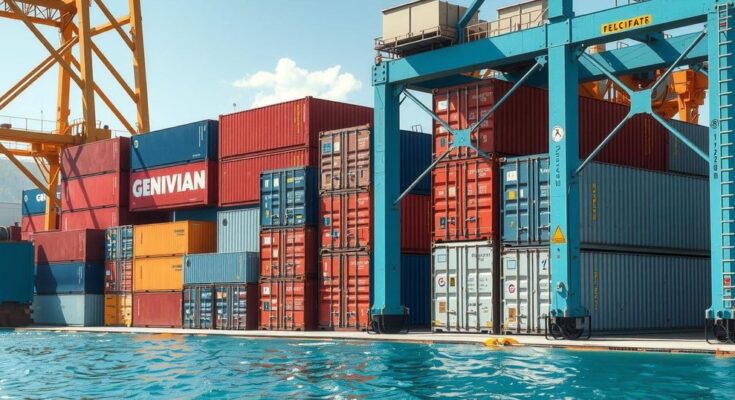Nigeria spends approximately $4 billion annually on steel imports, prompting the Minister of Steel Development to advocate for domestic production. The National Steel Raw Materials Exploration Agency is recognized as vital for this initiative. Additionally, livestock consumption in Southwest Nigeria exceeds N800 billion monthly, with plans to foster local production and involvement. Collaborative efforts like the COLDET project aim to facilitate sustainable community development in the region.
Nigeria incurs substantial expenditures, amounting to approximately $4 billion annually on steel imports. The Minister of Steel Development, Prince Shuaibu Abubakar Audu, emphasizes the necessity for import substitution to alleviate the nation’s foreign exchange burden. He recognizes the National Steel Raw Materials Exploration Agency (NSRMEA) as pivotal to the government’s strategy aimed at achieving a $1 trillion economy by 2030.
Minister Audu highlighted the importance of the NSRMEA operating at full capacity to enhance domestic steel production. He praised the agency’s performance, which has been favorably rated among ministry agencies. Furthermore, plans are underway to collaborate with the Ministry of Defence and the Defence Industries Corporation of Nigeria (DICON) to manufacture military hardware.
In a related context, the Development Agenda for Western Nigeria (DAWN) Commission reported that the Southwest region contributes over N800 billion monthly to red meat consumption. Dr. Seye Oyeleye, DAWN’s Director-General, stated that around 10,000 cows are slaughtered daily in the region, with Lagos alone accounting for approximately 7,000. Such high consumption levels underscore the region’s potential for self-sufficiency in the livestock sector.
Oyeleye advocated for increased regional involvement in livestock production, emphasizing the significance of local entrepreneurship in this industry. He pointed out that 99 percent of livestock consumed in the Southwest is sourced from other regions, stressing the necessity of harnessing local resources to promote cattle farming and enhance regional agricultural sustainability.
The DAWN Commission has delivered a ten-year livestock development plan to bolster meat, milk, and poultry production. Oyeleye described the Community-Led Development Toolkit (COLDET) project as an initiative aimed at fostering sustainable community development. This initiative empowers communities to identify their resources and prioritize development based on empirical evidence to enhance self-sufficiency.
The collaboration between DAWN and the Growth & Development Foundation (AGDF) is poised to illustrate how communities can lead their development through music and resources. Dr. Tunji Olugbodi expressed excitement for the partnership, which aligns with their agenda to rejuvenate community initiatives in the region.
As part of strategic improvements, Nigeria plans to conduct its first steel summit to garner stakeholder input for a cohesive industry growth strategy. Notably, the Metallurgical Industry Bill is progressing through the legislative framework and, once enacted, will provide regulatory guidance for the steel sector.
Minister Audu reported positive foreign direct investment (FDI) prospects, citing a recent commitment made during a presidential visit to New Delhi for producing five million metric tons of steel in Nigeria. Additionally, a $300 million investment from a Chinese company, Galaxy, is underway in Ogun State to enhance steel production capabilities.
Audu commented on the steel industry’s historical challenges, acknowledging a 45-year period of stagnation. Nevertheless, he expressed confidence in the reforms being implemented, with ambitious goals of attaining 10 million metric tons of steel production annually within five years. This shift aims to reduce dependency on imports significantly.
During a visit to the DICON factory, Minister Audu praised the corporation’s efforts to enhance Nigeria’s self-reliance in military hardware production. DICON’s Director-General, Maj Gen Aniedi Edet, noted the high costs associated with importing military equipment but remains hopeful that the partnership with the Ministry of Steel Development will successfully spearhead the production of military supplies for domestic use and potential export.
Audu also paid a courtesy visit to former President Muhammadu Buhari and communicated his objectives in Kaduna to Deputy Governor Dr. Hadiza Balarabe, reinforcing the strategic importance of developing Nigeria’s steel and livestock sectors for economic stability and growth.
In conclusion, Nigeria’s significant annual spending on steel imports emphasizes the urgent need for domestic production enhancements. The collaboration between various government ministries and agencies signifies a strategic direction toward achieving self-sufficiency in both the steel and livestock sectors. With ambitious goals and new partnerships, the nation aims to bolster its economic foundation, reduce import reliance, and enhance overall industrial capabilities for future growth.
Original Source: economicconfidential.com




